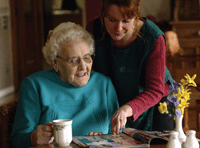
Not everyone with critical care needs would receive free personal care at home under the government’s Personal Care at Home Bill, published today.
The measure would apply only to those living at home with high personal care needs – defined as requiring help with four or more activities of daily living, such as washing, toileting or dressing.
The government estimates that about 277,000 older and disabled people who fall within the Fair Access to Care Services critical band would come into this category.
It estimates 66,000 are self-funders or those whose needs are currently not being met; 37,000 are paying means-tested charges; 166,000 are already receiving free care; 5,000 are receiving informal care and just over 2,000 are in residential care.
Under the bill, self-funders or those new to the system would be expected to undergo a period of reablement before being assessed on their eligibility for free personal care.
The bill would extend the availability of reablement services, designed to help people regain independence, to 130,000 people a year at an annual cost of £130m. The free care policy would cost £540m a year.
However, the Department of Health has estimated that there is an “inherent uncertainty” in calculating the costs of providing free care at home to the target group, saying more accurate figures would emerge over the next two and a half years.
It said estimating the costs of reablement provision was also “difficult” because of the lack of information on the number of people already receiving such services.
The bill does not apply to Scotland, where there is free personal care for older people, and the UK government will seek the Welsh Assembly’s agreement on the plan being applied in Wales.
Related articles
Free personal care bill published today
Is spending on domiciliary care rather than care home places more effective?


 Bournemouth, Christchurch and Poole
Bournemouth, Christchurch and Poole  Hampshire County Council
Hampshire County Council  Lincolnshire County Council
Lincolnshire County Council  Norfolk County Council
Norfolk County Council  Northamptonshire Children’s Trust
Northamptonshire Children’s Trust  South Gloucestershire Council
South Gloucestershire Council  Wiltshire Council
Wiltshire Council  Wokingham Borough Council
Wokingham Borough Council  Children and young people with SEND are ‘valued and prioritised’ in Wiltshire, find inspectors
Children and young people with SEND are ‘valued and prioritised’ in Wiltshire, find inspectors  How specialist refugee teams benefit young people and social workers
How specialist refugee teams benefit young people and social workers  Podcast: returning to social work after becoming a first-time parent
Podcast: returning to social work after becoming a first-time parent  Podcast: would you work for an inadequate-rated service?
Podcast: would you work for an inadequate-rated service?  Family help: one local authority’s experience of the model
Family help: one local authority’s experience of the model  Workforce Insights – showcasing a selection of the sector’s top recruiters
Workforce Insights – showcasing a selection of the sector’s top recruiters 

 Facebook
Facebook X
X LinkedIn
LinkedIn Instagram
Instagram
Comments are closed.